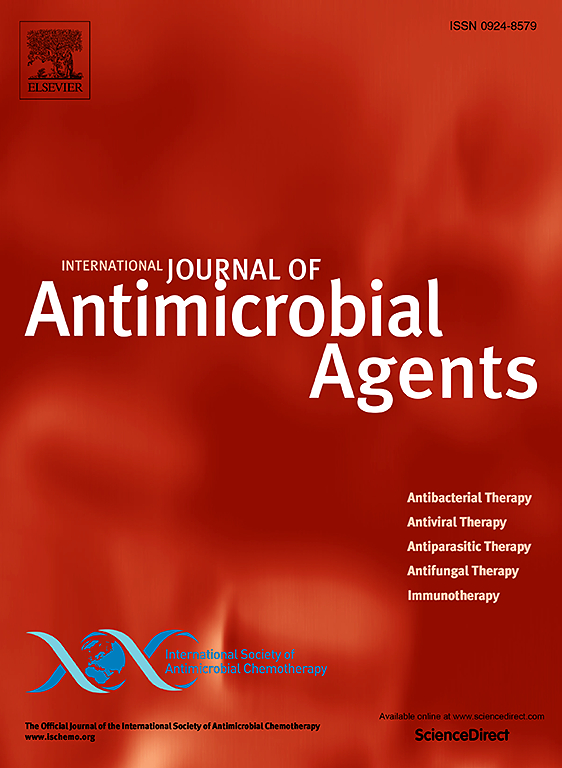cellabutricclostridium对铜绿假单胞菌感染的益生菌作用
IF 4.6
2区 医学
Q1 INFECTIOUS DISEASES
International Journal of Antimicrobial Agents
Pub Date : 2025-04-03
DOI:10.1016/j.ijantimicag.2025.107503
引用次数: 0
摘要
抗生素使用引起的肠道菌群失调削弱了其对机会性病原体的定殖抵抗力,增加了入侵和感染的风险。虽然益生菌具有恢复受损肠道微生物结构和预防呼吸道感染的潜力,但特定菌株的有效性及其潜在机制在很大程度上仍未被探索。本研究在抗生素预处理的小鼠模型中,研究了一种新型丁酸产菌——cellabutyricum YQ-FP-027T对抗生素暴露后铜绿假单胞菌感染的预防作用。进行了表型表征,包括肺部细菌负荷,使用qPCR评估肺组织中免疫因子的基因表达,以及使用16S rRNA测序检测肠道微生物组成。评估肺部细菌负荷、肺组织免疫因子表达水平和肠道微生物组成。我们的研究结果表明,YQ-FP-027T改善了肺组织的完整性,显著降低了肺细菌负荷,降低了IL-1β和TNF-α的表达,同时提高了IL-10和CRAMP的表达。此外,YQ-FP-027T增加了肠道中毛螺杆菌科的丰度,降低了肠球菌科和幽门杆菌科等条件致病菌的丰度。这些结果表明,YQ-FP-027T通过肠-肺轴恢复肠道菌群平衡,增强肠道屏障功能,并积极影响肺免疫反应,从而发挥益生菌作用。本研究揭示了YQ-FP-027T在肠道菌群失调背景下对铜绿假单胞菌感染的预防潜力,提供了一种新的预防策略。本文章由计算机程序翻译,如有差异,请以英文原文为准。

Probiotic effects of Clostridium cellabutyricum against Pseudomonas aeruginosa infection in antibiotic-induced gut microbial dysbiosis mice model
Objective
Gut microbiota dysbiosis induced by antibiotic use weakens its colonization resistance against opportunistic pathogens, increasing the risk of invasion and infection. While probiotics have the potential to restore the impaired gut microbial structure and prevent respiratory tract infections, the effectiveness of specific strains and the underlying mechanisms remain largely unexplored. In this study, the preventive effects of a novel butyrate-producing bacterium, Clostridium cellabutyricum YQ-FP-027T against Pseudomonas aeruginosa infection after antibiotic exposure were investigated in antibiotic-pretreated mice model.
Methods
Phenotypic characterizations including the bacterial load in the lung, the assessment of gene expression of immune factors in lung tissue using qPCR, and detection of gut microbial composition using 16S rRNA sequencing were conducted. Pulmonary bacterial load and expression levels of immune factors of lung tissue, and gut microbial composition were evaluated.
Results
Our results demonstrated that YQ-FP-027T ameliorated lung tissue integrity, significantly reduced pulmonary bacterial burden, and decreased the expression of interleukin-1β and TNF-α, while enhancing the expression of interleukin-10 and cathelicidin-related antimicrobial peptide. Furthermore, YQ-FP-027T increased the abundance of Lachnospiraceae in the gut and reduced the abundance of opportunistic pathogens such as Enterococcaceae and Helicobacteraceae.
Conclusions
These results suggest YQ-FP-027T exerts probiotic effects by restoring gut microbiota balance, enhancing intestinal barrier function, and positively influencing pulmonary immune responses through the gut-lung axis. This study reveals the preventive potential of YQ-FP-027T against P. aeruginosa infection in the context of gut microbiota dysbiosis, offering a novel preventive strategy.
求助全文
通过发布文献求助,成功后即可免费获取论文全文。
去求助
来源期刊
CiteScore
21.60
自引率
0.90%
发文量
176
审稿时长
36 days
期刊介绍:
The International Journal of Antimicrobial Agents is a peer-reviewed publication offering comprehensive and current reference information on the physical, pharmacological, in vitro, and clinical properties of individual antimicrobial agents, covering antiviral, antiparasitic, antibacterial, and antifungal agents. The journal not only communicates new trends and developments through authoritative review articles but also addresses the critical issue of antimicrobial resistance, both in hospital and community settings. Published content includes solicited reviews by leading experts and high-quality original research papers in the specified fields.

 求助内容:
求助内容: 应助结果提醒方式:
应助结果提醒方式:


